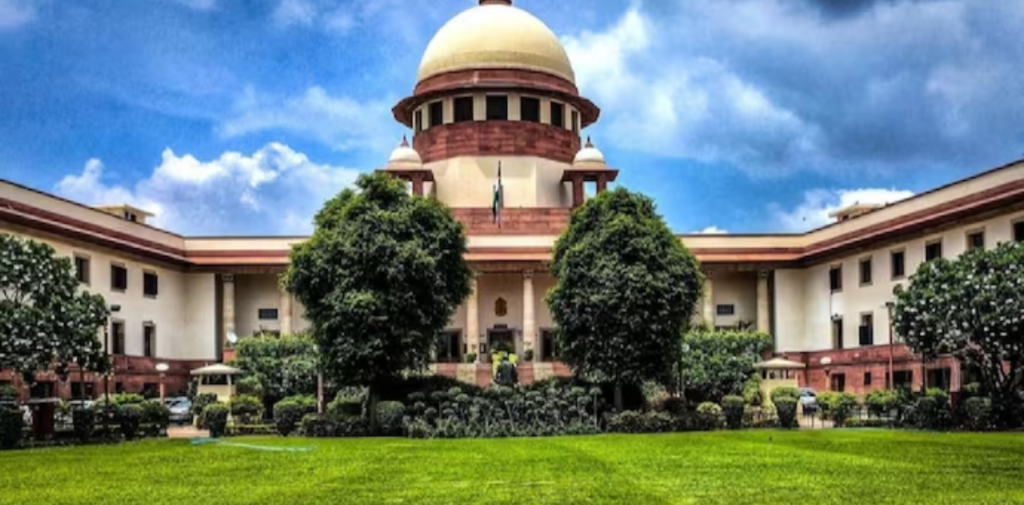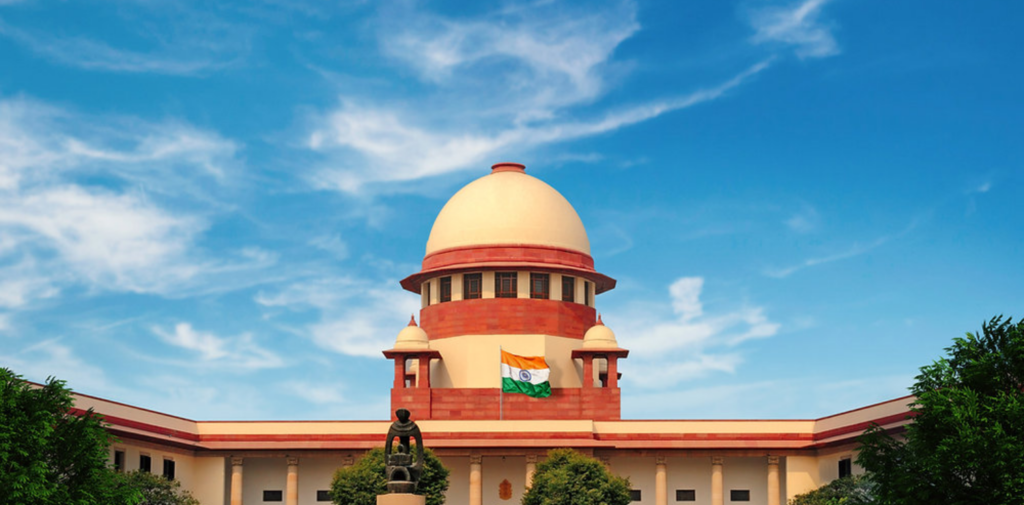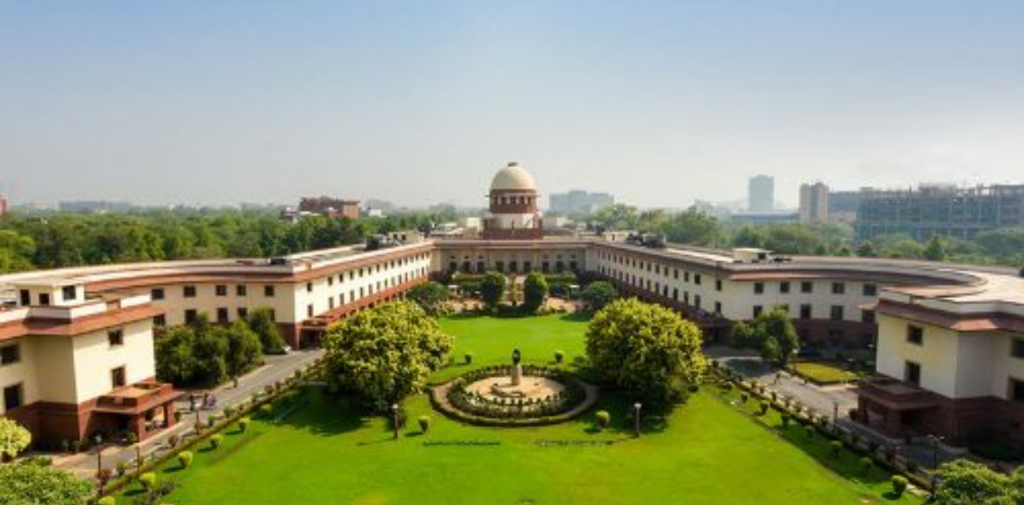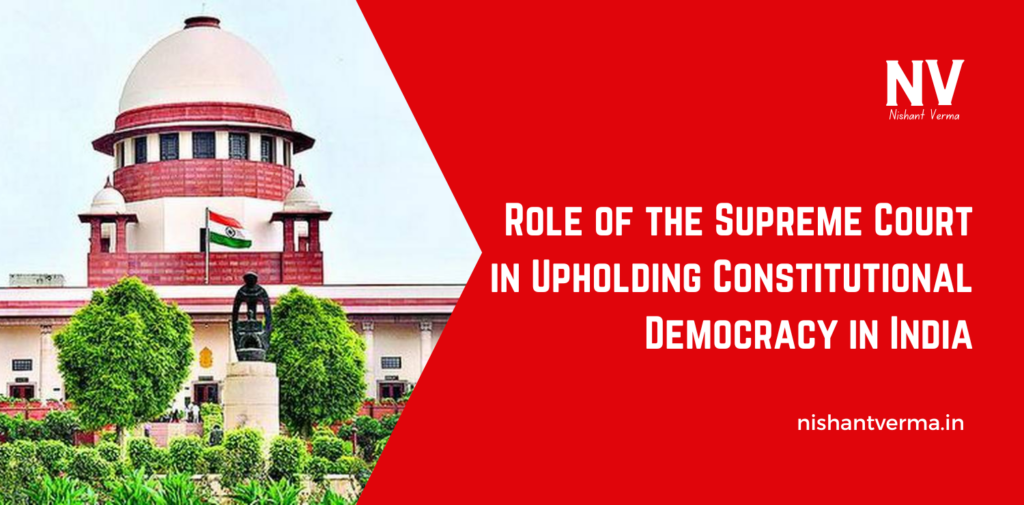India, the world’s largest democracy, is built on the principles of justice, equality, and freedom. These values are protected by the Indian Constitution, which lays down the rules for how the country should be governed. But who makes sure that everyone follows the Constitution? Who steps in when someone violates these rules? This is where the Supreme Court of India plays a very important role. In this article, we will explore Role of the Supreme Court that helps to protect India’s democratic system and ensures that the Constitution remains the guide for the nation.
What is the Supreme Court of India?
The Supreme Court of India is the highest court in the country. It is like the final boss in a video game — if you can’t solve a problem at lower levels, you go to the Supreme Court. It was established on January 26, 1950, and is located in New Delhi. The Supreme Court has the power to hear cases involving important laws and issues and make decisions that affect the entire country.

The Importance of the Constitution
The Constitution of India is like a big rulebook for the country. It tells us how the government should work, what rights people have, and how laws should be made. The Constitution also lays down the separation of powers, meaning that the government has three parts:
- The Legislature (the Parliament) – makes laws
- The Executive (the President, Prime Minister, and Cabinet) – runs the country
- The Judiciary (the courts) – makes sure the laws are followed
The Supreme Court is the guardian of this rulebook. Its job is to protect the Constitution from being broken or misused.
How Does the Supreme Court Uphold the Constitution?
The Supreme Court plays many important roles in keeping the Constitution safe. Let’s look at some of the most important ways it does this:
Protecting Fundamental Rights
One of the key features of the Indian Constitution is that it guarantees fundamental rights to all citizens. These rights include the right to equality, freedom of speech, right to life, and much more. But sometimes, governments or people try to take away these rights. When that happens, people can go to the Supreme Court for help.
For example, if someone is unfairly arrested or their freedom of speech is taken away, they can go to the Supreme Court and ask for justice. The Supreme Court will then decide if their rights are being violated and what should be done to protect them.
Famous Example: The Right to Privacy Case
In 2017, the Supreme Court of India declared that the right to privacy is a fundamental right. This was a huge decision, as it protected people from unnecessary interference by the government in their personal lives. This ruling showed how the Supreme Court helps protect individual freedoms and rights.
Judicial Review: Checking the Laws
The Supreme Court has the power of judicial review, which means it can examine laws passed by the government to ensure they are in line with the Constitution. If a law goes against the Constitution, the Supreme Court can cancel it.
For example, if the government passes a law that takes away people’s rights or is unfair, the Supreme Court can strike down that law. This helps keep the government from making decisions that go against the values of the Constitution.
Famous Example: Kesavananda Bharati Case
In the Kesavananda Bharati case (1973), the Supreme Court ruled that the basic structure of the Constitution could not be changed by the government. This meant that even the Parliament couldn’t pass laws that would destroy the core principles of the Constitution.

Protecting the Separation of Powers
In India, the separation of powers ensures that no one branch of the government becomes too powerful. The Supreme Court helps maintain this balance. For example, it can make sure that the government (the executive) and Parliament (the legislature) do not misuse their powers.
Sometimes, the government may try to do things that are not allowed by the Constitution. If this happens, the Supreme Court steps in and tells the government to follow the rules.
Resolving Disputes
The Supreme Court also plays a big role in resolving disputes between different parts of the government. Sometimes, the state governments and the central government may disagree on something. The Supreme Court can settle these disputes and ensure that the Constitution is followed correctly.
Example: Centre vs. States Disputes
In the past, the Supreme Court has played a key role in solving issues between the central government and state governments, such as the distribution of resources or power. By doing this, the Court helps maintain peace and order in the country.
Upholding the Rule of Law
One of the most important things the Supreme Court does is ensure that everyone, including the government, follows the law. This is called the rule of law. If anyone breaks the law — whether it’s a politician, a businessman, or even a citizen — the Supreme Court can step in to make sure justice is done.
The Supreme Court’s job is not to make laws but to ensure that laws are fair and just. It holds everyone accountable, from ordinary people to the highest leaders of the country.
Defending Democracy and Freedom
The Supreme Court plays an important role in protecting India’s democracy. Democracy means that the people have the power to make decisions through elections and voting. It also means that the government can’t take away people’s rights without good reasons.
The Supreme Court ensures that everyone’s voice is heard and that the government doesn’t do anything that goes against the principles of democracy. It protects the rights of people to speak freely, practice their religion, and express their opinions without fear.
Example: Emergency and the Right to Life
During the Emergency (1975-77), when the government suspended many rights and freedoms, the Supreme Court stood firm in protecting the rights of people. Even though many people were jailed, the Supreme Court ensured that the right to life and personal liberty could not be taken away without valid reasons.

Challenges Faced by the Supreme Court
While the Supreme Court has an important role, it also faces challenges in its work. Some of the main challenges are:
- Overloaded with Cases: The Supreme Court receives thousands of cases every year. Sometimes, it takes a long time to hear and decide cases.
- Political Pressure: Like any institution, the Supreme Court can sometimes face pressure from political parties or the government. However, it tries to stay independent and impartial.
- Lack of Awareness: Many people don’t fully understand how the Supreme Court works or their rights under the Constitution. This makes it harder for people to approach the Court when they need help.
Despite these challenges, the Supreme Court continues to work hard to protect India’s Constitution and democracy.
Conclusion: Role of the Supreme Court
The Supreme Court of India is one of the most important institutions in the country. It ensures that the Constitution is followed, that people’s rights are protected, and that the government is held accountable. Through its power of judicial review, it keeps a check on the government and ensures that India’s democracy remains strong.
Without the Supreme Court, India’s democracy would be at risk. It is like a shield that protects the rights and freedoms of every citizen. So, next time you think about justice or fairness, remember that the Supreme Court is working hard to make sure that the rules of the Constitution are respected by all.
The Supreme Court not only plays a big role in solving legal problems but also ensures that India remains a country where democracy and the rule of law thrive for all.




